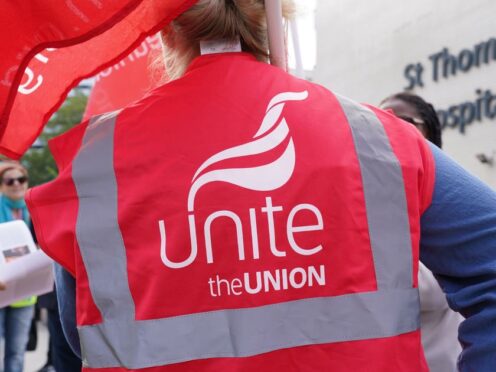
One of the UK’s largest trade unions has declined to endorse the Labour election manifesto after accusing the party of weakening its package of workers’ rights.
Unite refused to give its backing to the final version of the policy document, which was signed off on at the party’s closed-doors Clause V meeting on Friday.
Sources told the PA news agency that Labour’s stance on practices like fire-and-rehire meant the affiliated union could not support its policy platform, raising questions about whether it will fund the party as the election looms.
Having control over our energy needs is essential for national security. With the #NorthSea on our doorstep it would be disastrous if we allowed ourselves to be held to ransom by other nations. There can be #NoBanWithoutAPlan @UniteEconomy ➡️ https://t.co/3x6YWZlDA7 pic.twitter.com/RzawZVDlFR
— Sharon Graham (@UniteSharon) June 6, 2024
Party figures had described the meeting as “positive” after shadow ministers, union representatives, MPs and members gathered to set the seal on the final version of the manifesto.
A Labour spokesperson said: “Today’s meeting has endorsed Labour’s manifesto. On July 4, the British people will have the chance to vote for change – to stop the chaos, turn the page and start to rebuild our country.”
However, Unite general secretary Sharon Graham, who has previously called for the party to offer strengthened employment rights like an outright ban on fire-and-rehire, cancelled planned talks with reporters after the gathering.
The union, which donated £3 million to Labour’s campaign in 2019, warned last year that there were “no blank cheques” for the party as it urged the leadership to offer “bolder” policies.
Left-wing group Momentum also said it was “deeply disappointed” the party had not committed to free school meals or scrapping the two-child benefit cap.
“We need to kick out not just the Tories, but Tory policies too,” a spokesperson said.
Shadow foreign secretary David Lammy said he was “surprised to hear” that Unite had declined to back the policy document because there had been no votes against the proposals at the meeting.

“I’m surprised to hear that, because genuinely, hand on heart, I’d say that wasn’t the mood of the room,” he told Times Radio.
The SNP, which is fighting to hold on to seats targeted by Labour north of the border, said the fallout was “damning” after Unite sources cited Labour’s stance on oil and gas as another reason for the union’s opposition.
Depute leader Keith Brown said: “It’s damning that a major trade union has refused to endorse the Labour Party manifesto because of the threat to thousands of jobs in Scotland’s energy sector – and the watering down of workers’ rights proposals.
“It’s clear that only the SNP can be trusted to stand up for Scotland. A vote for the SNP on July 4 is a vote to protect Scottish jobs and put Scotland’s interests first.”
The finer points of Labour’s manifesto have been kept tightly under wraps after 2017’s draft version was leaked, with attendees of the party’s Clause V meeting only told its central London location this morning.
The gathering takes its name from the fifth clause of the party rulebook, which seeks to ensure members, affiliated organisations and elected representatives are all able to take part in policy formulation.
The manifesto will be based on the party’s five missions for government announced last year on the economy, the NHS, energy, education and planning reform.
With our five national missions, Labour will get Britain’s future back. pic.twitter.com/hhsqLv4g37
— Keir Starmer (@Keir_Starmer) October 14, 2023
Labour has watered down some of its previous commitments, such as a pledge to spend £28 billion a year on green energy projects, as it seeks to reassure voters that it would manage the economy responsibly in government.
Party policies now include the creation of GB Energy, a publicly owned sustainable power company, 40,000 more NHS appointments a week and the recruitment of 6,500 new teachers to plug gaps in the workforce.
Earlier on Friday, Sir Keir also confirmed that recognition of Palestinian statehood as part of any Middle East peace process would be included in the document.
The Labour leader suggested that such a move should not be blocked by a neighbouring country, saying it was an “inalienable right” of Palestinians and not in “the gift of Israel”.
It comes after the party faced setbacks in the local elections in some previously safe areas, particularly those with large Muslim populations, where candidates may have suffered as a result of Sir Keir’s stance on the Gaza war.
Meanwhile, the BBC reported Sir Keir’s party will commit to measures cracking down on companies that refuse to comply with its plans for training British workers.
The government would be able to block individual firms from sponsoring work visas if it believed the employer was not doing enough to carry out domestic training in key sectors such as care and construction under the reported plans.
The manifesto is expected to be officially launched on June 13 ahead of the General Election on July 4.

Enjoy the convenience of having The Sunday Post delivered as a digital ePaper straight to your smartphone, tablet or computer.
Subscribe for only £5.49 a month and enjoy all the benefits of the printed paper as a digital replica.
Subscribe